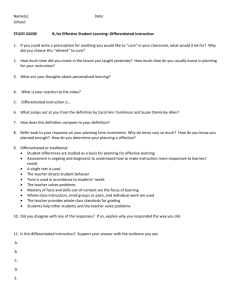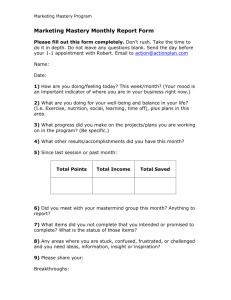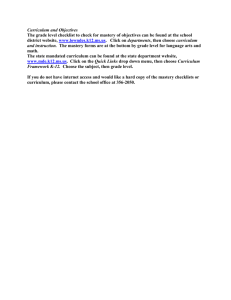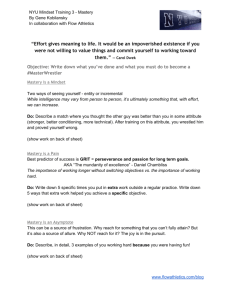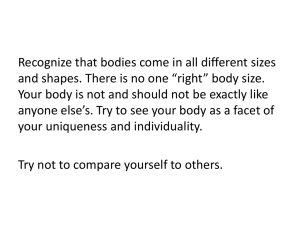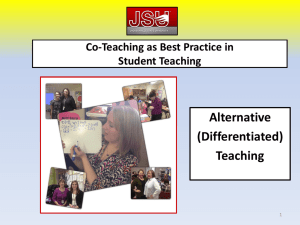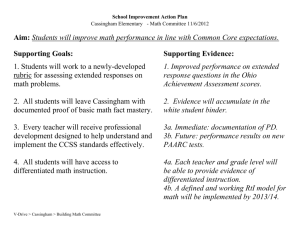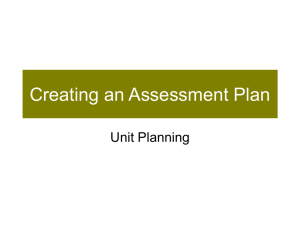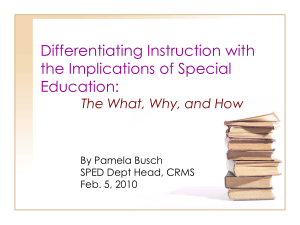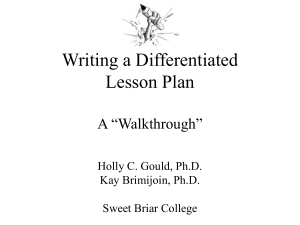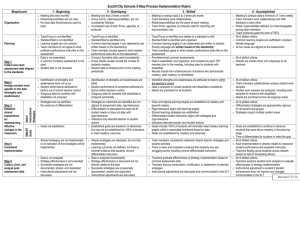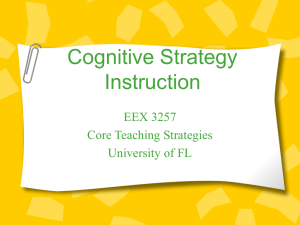Exemplar Session Plan - Edge Hill University
advertisement
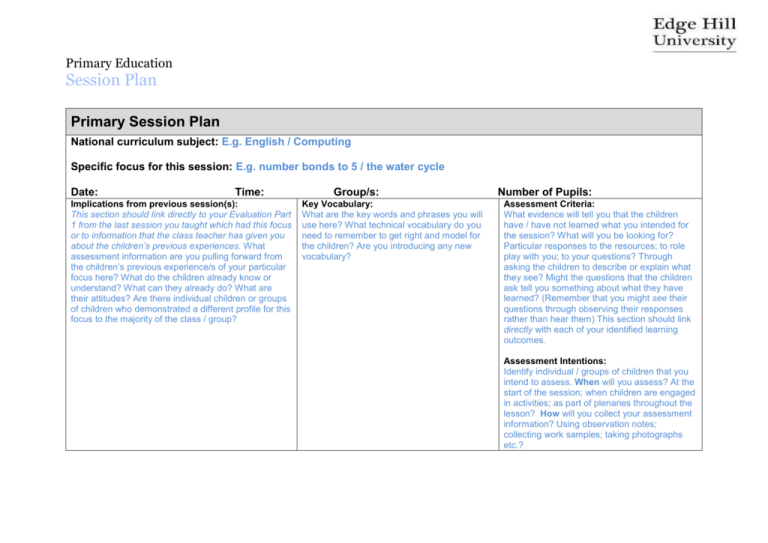
Primary Education Session Plan Primary Session Plan National curriculum subject: E.g. English / Computing Specific focus for this session: E.g. number bonds to 5 / the water cycle Date: Time: Implications from previous session(s): This section should link directly to your Evaluation Part 1 from the last session you taught which had this focus or to information that the class teacher has given you about the children’s previous experiences. What assessment information are you pulling forward from the children’s previous experience/s of your particular focus here? What do the children already know or understand? What can they already do? What are their attitudes? Are there individual children or groups of children who demonstrated a different profile for this focus to the majority of the class / group? Group/s: Key Vocabulary: What are the key words and phrases you will use here? What technical vocabulary do you need to remember to get right and model for the children? Are you introducing any new vocabulary? Number of Pupils: Assessment Criteria: What evidence will tell you that the children have / have not learned what you intended for the session? What will you be looking for? Particular responses to the resources; to role play with you; to your questions? Through asking the children to describe or explain what they see? Might the questions that the children ask tell you something about what they have learned? (Remember that you might see their questions through observing their responses rather than hear them) This section should link directly with each of your identified learning outcomes. Assessment Intentions: Identify individual / groups of children that you intend to assess. When will you assess? At the start of the session; when children are engaged in activities; as part of plenaries throughout the lesson? How will you collect your assessment information? Using observation notes; collecting work samples; taking photographs etc.? Primary Education Session Plan Differentiated Learning Objectives: Building on the implications from previous lesson(s) for this focus what specifically do you want the children to learn in this session? What new skill? What new knowledge or new understanding? What new attitude or disposition? Think about deepening or broadening the children’s prior learning. Think about supporting their mastery of the focus. Identify: a core learning objective for the majority of the children; a differentiated objective for the more able children which might give them the opportunity to develop further mastery; differentiated objectives for less able children and those with specific needs. Resources: What resources will you need to have ready? Do different groups need different resources to effectively support their learning? What resources are the children used to? Are they appropriate and helpful here? Additional Adults: How do you plan to use any additional adult/s in the classroom to support children’s learning? Take into account each adult’s expertise, competencies and confidence. Think about how you will explain what you would like them to do. Make sure they know what kind of information about the children’s learning you would like them to share with you after the session. Tell them how you would like them to collect assessment information. You should ensure that these additional adults have a positive impact on children’s learning in the session. Share key vocabulary with all additional adults. Think about how you will share the key vocabulary with these additional adults. Links with other programmes of study: Focus for the development of your teaching: Identify for yourself the aspect/s of your teaching that you want to focus on and develop in this particular session. Refer back to the targets set by your trainer from your last lesson observation; feedback from your class teacher; your own evaluation of your teaching. Your focus may be generic and / or subject-specific e.g. improve the organisation of transitions within the session; challenge more able learners to deepen their understanding; apply sanctions in a positive manner; enunciate phonemes correctly in phonics teaching; use models and images effectively to support understanding in mathematics; be specific about success criteria for the children in gymnastics sessions. Thinking about this before you plan and deliver your session will help you to be more focussed in your evaluation of your own teaching and will support you in taking responsibility for your own on-going, continuous professional development. Primary Education Session Plan Timing Teaching and Learning Steps Plan out the structure of your session What will you do to ensure the children achieve your intended learning objective? What teaching strategies will you use? What do you anticipate that the children will do? Make sure that you include your intended differentiation for the more able children and for those with individual needs. This should weave through your plan. Include enough detail to support your teaching – to ensure that you are able to maintain the progression through the session that you intend. Include information about how additional adults will be part of the learning. Delete unused rows Primary Education Session Plan Evaluation Part 1 : The Children’s Learning Date: Learning & Progression Did the children achieve the intended learning objective/s? How well did they achieve them? What impact has your teaching had on the children’s progress? How do you know that all the children have made rapid progress? How do the children themselves know? Session Focus: Primary Education Session Plan Analyse the assessment data that you have collected. (You might need to attach this separately or signpost to where you have stored it in your assessment records) What does it tell you about the children’s knowledge, understanding, skills and attitudes now? Which children achieved the intended learning outcome? Which children didn’t? Which children actually needed something more challenging? (This is the information you will pass through to your next plan in the ‘implications from previous session/s’ box) Have all of the children made progress in this session? (You identified their previous learning at the beginning of the planning process) Start to reflect on why the children may / may not have achieved your intended learning objective/s. This is essential to help you plan your next steps for this focus. For example, consider the following: Was the children’s interest captured by another question that arose from the session? If so, what were the actual learning outcomes? Should you continue to pursue those or find another way to bring the children back to your original objective? Had you misjudged what would engage the children or capture their attention? Do you need to develop more imaginative and creative approaches that will meet individual needs and interests? Have you found a strategy that really engages the children and seemed to cause them to make rapid progress? If so, how will you build on that? Did the session reveal a key misconception that prevented the children from achieving the intended learning outcome? If so, how will you address that misconception in the next session? Is there a particular group of children who are not making progress? Children with EAL? Children with SEN/D? Boys? What will you do to address this? Is there a particular child who has dis-engaged from learning? Is this unusual behaviour for this child? Do you need to raise concerns? What can you do you help them re-engage? Are their gaps in your own subject knowledge that led to the children failing to make progress? If so, what will you do to address that and what do you need to do to repair the children’s learning? Do you have concerns about a particular child or group of children whose progress seems to have stalled? What might be causing that? What action will you take? Primary Education Session Plan Evaluation Part 2 : Your Professional Development Date: Session Focus: Evaluate Next Steps Think about your teaching in this lesson – positive and negative. Ask yourself: How did I want my teaching to develop in this lesson? How did that go? What else happened? What do I want to happen next time? How will I make that happen? The following are prompts you are not expected to address every point. This part of the ‘plan > teach > assess/evaluate’ cycle is a vital step in improving your practice and you should complete it after every one of your sessions but make sure that you only spend between 5 and 10 minutes on it. Be concise and focused. Have you set high expectations which inspired, motivated and challenged the children? How did you? How might you do this next time? Have you promoted good progress and outcomes by the children? How? How might you do this next time? Have you demonstrated good subject knowledge? How might you develop your mastery further? What might you do to improve? Did you plan a well-structured session? What approach might you try next? What might you do to improve? Did you adapt your teaching to respond to the strengths and needs of all children? When did you do that? What was the impact? Did you recognise an opportunity that you missed to do this? Did you collect accurate and productive assessment information? Have you made effective use of it? How might you develop that further in your next session? Did you manage the children’s behaviour effectively? How did you build your relationships with them in this session? Did you keep them engaged? What did you do when the children lost attention and interest? What might you do to improve your teaching so that it holds the children’s attention? Did you deploy additional adults effectively? What were the barriers to effective communication between you and the other adults? How might you address these barriers? How might you build on the skills and interests of the other adults in the classroom? Next Steps… Identify your next steps in developing your practice. These steps may refer directly to the ongoing targets set by your trainer from your observed lessons or they may be aspects of your teaching that you want to have as an additional focus. Think about strategies you might use to enable you to take these next steps.
